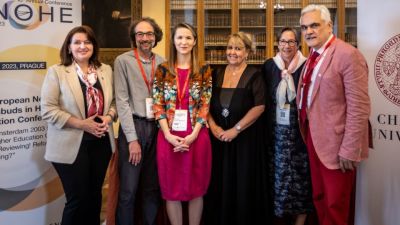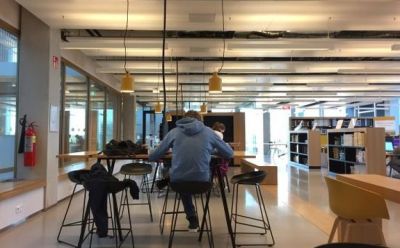For the third time, Charles University participated in the Times Higher Education Impact Rankings 2023, an international comparison of how universities approach Sustainable Development Goals. The best result, 35th out of 960 participating schools, was achieved in the Decent Work and Economic Growth category. “The rankings help to raise the profile of the many activities of universities in the area of the SDGs, and thus demonstrate their importance as public institutions,” says Jiří Chvátal from CU's Department of Analysis and Strategy.

CU organises a number of educational events with sustainability-related themes, here for example the Day with CU at Kampus Hybernská.
Over 1,600 universities participated in the Times Higher Education University Impact Rankings this year. Charles University was ranked 201-300th overall, the same as in the previous period. However, this year it clinched its highest ever ranking in some of the areas assessed, for example, it ranked 35th out of 960 schools in the Decent Work and Economic Growth goal. It moved up five places compared to last year in the Peace, Justice and Strong Institutions objective [relating to university governance, guarantees of academic freedoms- ed. note].
It was ranked 50th out of almost a thousand universities that took part in the comparison. This is because universities can choose which objectives they provide data for, and a condition for appearing in the overall comparison is that they complete data for one mandatory objective (namely partnerships to meet objectives) and at least three other objectives of their choice. As in the previous year, Charles University participated in the assessment of nine goals (3. Health and quality of life, 4. Quality education, 5. Gender equality, 8. Decent work and economic growth, 9. Industry, innovation and infrastructure, 10. Less inequality, 11. Sustainable cities and communities, 16. Peace, justice and strong institutions and 17. Partnership for achieving the goals).
In its strategic plan for 2021-2025, Charles University is committed to contributing to the quality of life of society and the sustainability of life in general as part of its social responsibility. As Nikola Rusová, who oversees this agenda at CU Rector's Office points out, the Times Higher Education Impact Rankings 2023 data is evaluated retrospectively and therefore the results do not reflect, for example, the fact that Charles University has a newly approved Sustainable Development Strategy and Action Plan for the period 2023-2024. Thanks to this international ranking, CU has the opportunity to compare itself with its domestic and international peers and possibly also gain inspiration where it could or should do more.

“The newly approved Sustainable Development Strategy and Action Plan could help us to position ourselves better in the coming years,” says
Nikola Rusová.
In the category of Decent Work and Economic Growth, Charles University rose from last year's 101st-200th place to 35th spot. The subject of the evaluation of this goal is mainly the quality of universities as a responsible employer. This includes, for example, demonstrable research activity in this area, guarantees of minimum wages and employee rights (e.g. measures against discrimination), the existence of trade unions, equal pay, average expenditure per employee or the proportion of students with a compulsory internship of at least one month or the proportion of employees with employment contracts of more than two years. “The position of Charles University here is partly based on general legislation (minimum wage, protection of employee rights), and partly related to its policy in this area,” says Jiří Chvátal from the Department of Analysis and Strategy at the Rectorate.
On the other hand, the lowest (601-800th place) is the position of CU in the category of Partnerships for meeting objectives, which is mainly due to the fact that the university has not yet comprehensively evaluated how it manages to meet individual objectives. “We can expect a leap forward here in the future thanks to this year's adoption of the Sustainable Development Strategy, as it is of course planned to evaluate its implementation,” says CU Sustainability Manager Nikola Rusová.
In the Gender Equality and Industry, Innovation and Infrastructure objectives, the University ranked 401-600th (out of 1,081 and 873 participating schools, respectively). In the first case, this is partly due to the fact that CU does not have to take measures to support the study of women, who overall make up more than 60% of students at the university, which is not commonplace in all countries. Partly, then, it stems from the fact that the university recently adopted a comprehensive policy for this area in the form of the Equal Opportunities Plan 2022-2024, where long-term goals include, for example, increasing the representation of women in senior academic positions. In the case of the Industry, Innovation and Infrastructure goal, the result is mainly due to the fact that spin-off companies and transfer funds are areas were launched sonly more in recent years - it is for this purpose that the university established its subsidiary Charles University Innovations Prague in 2018.
In the Health and Quality of Life, Quality Education and Sustainable Cities and Towns goals, Charles University is ranked 101-200th this year, and in the Less Inequalities goal it is ranked 201-300th.

Female students consistently make up 60% of students at CU. One goal is to increase the representation of women in senior academic positions.
The Times Higher Education University Impact Rankings focus on the social responsibility of universities. “Rankings should be taken as a starting point, not a final conclusion. As with other international comparisons, one cannot expect a comprehensive view of the differences in quality between universities. However, this comparison can also serve as an inspiration on which areas a particular university could focus even more. Last but not least, this ranking contributes to the visibility of the numerous activities of universities in the field of the Sustainable Development Goals, thus demonstrating their importance as public institutions,” summarises Jiří Chvátal.



















